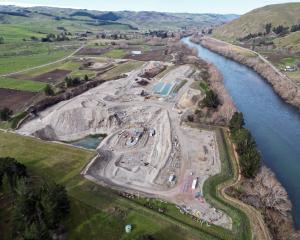
Lake Dunstan is getting its own long-term plan to deal with the weed lagarosiphon, pleasing the lake's guardians.
Guardians of Lake Dunstan chairman Andrew Burton said he attended a Lake Dunstan Aquatic Weed Management Group meeting on Friday, at which a new 10-year lagarosiphon control strategy was discussed.
''At last, we are getting some action,'' he said.
The management group, created by Land Information New Zealand (Linz), was formed in June to find ways of controlling the fast-growing African aquatic plant in Lake Dunstan.
It was made up of stakeholders, including the Central Otago District Council, Otago Regional Council, Contact Energy, Fish and Game, Clutha Fisheries Trust, and Cromwell and Districts Community Trust.
A freshwater ecologist from the National Institute of Water and Atmospheric Research (Niwa), Mary de Winton, would also provide assistance and draft the new long-term strategy.
''She gave very good presentations which explains the background and the current position [of the lake] and going forward,'' Mr Burton said.
''It went very well. Quite a positive meeting.''
Linz biosecurity manager Dave Mole said collaboration was the key to weed control.
''We already do a lot of work at the lake, but we're always looking for smarter ways of controlling these weeds,'' he said.
''The expertise of local government, advocacy and community groups, together with scientific support from Niwa, will help make sure we're on the right track.''
The long-term plan will include a list of priority sites and preferred methods of controlling the weed, including spraying and mechanical options, such as mulching, suction dredging and hand weeding.
It comes as a second 10-year plan is being developed by the Lake Wanaka Lagarosiphon Management Committee.
Two-thirds of Lake Wanaka has been cleared of the weed since the first 10-year plan was established in 2005.
The plans would differ because the lakes faced different challenges and priorities, Mr Mole said.
It was hoped a draft long-term plan for Lake Dunstan would be completed by the end of November.
Alternative methods proposed by the guardians group, which promoted mechanical harvesting rather than herbicide spraying to control the weed, would also be investigated.












